Applying the REM Framework to Ensure Cultural Respect in Nursing
VerifiedAdded on 2023/03/23
|6
|1078
|69
Report
AI Summary
This report discusses the application of the REM (Respect, Engagement, Moving Forward) framework in ensuring cultural respect for indigenous Australians within healthcare settings. It highlights the health inequalities faced by indigenous people due to various factors, including low income, lack of education, and cultural differences. The report emphasizes the importance of cultural competency for nurses, including understanding indigenous beliefs and values, practicing person-centered care, and building trust. It also stresses the need for collaborative partnerships between healthcare staff and indigenous communities to develop and implement evidence-based strategies. The report concludes by advocating for ongoing self-reflection and knowledge enhancement among healthcare professionals to foster a culturally respectful environment and improve health outcomes for indigenous populations.
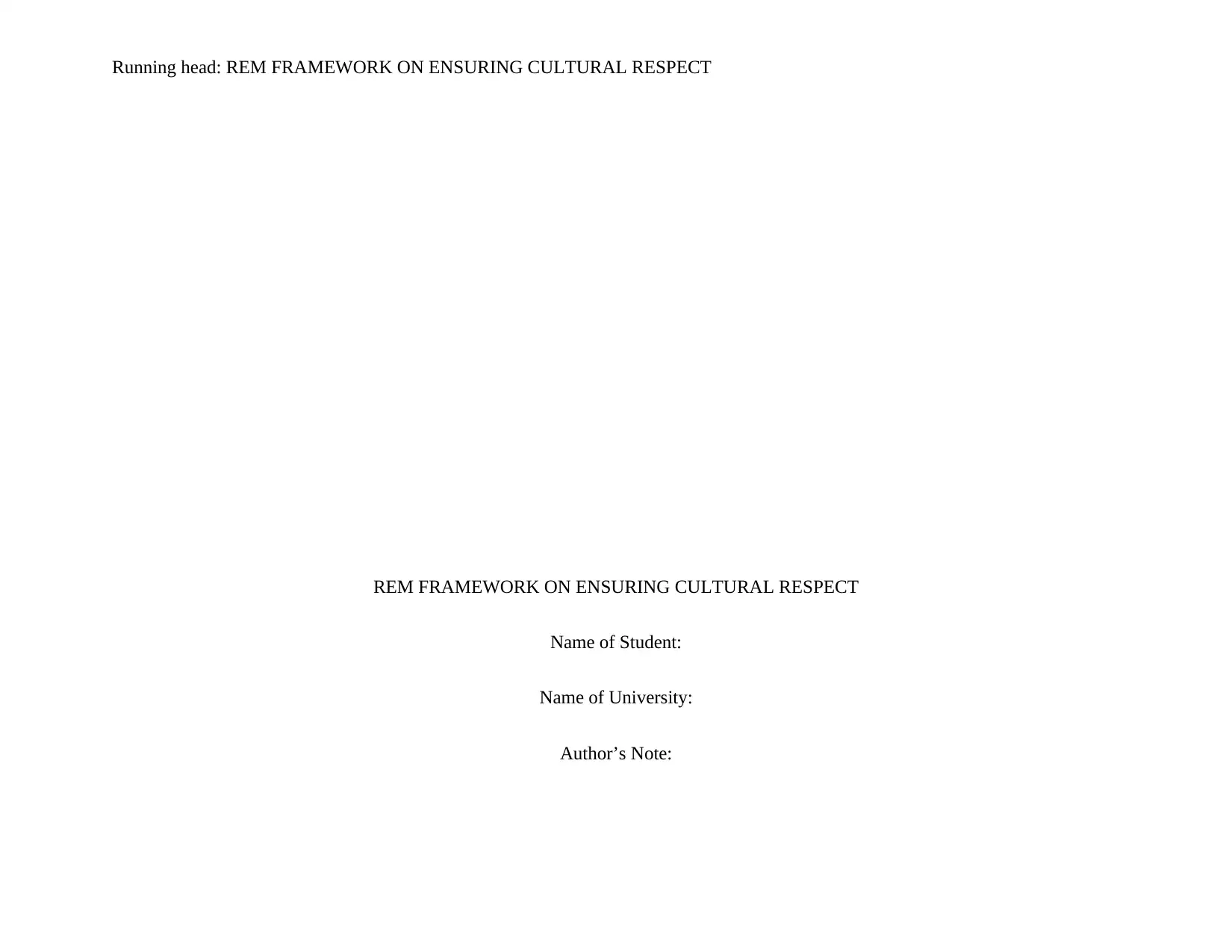
Running head: REM FRAMEWORK ON ENSURING CULTURAL RESPECT
REM FRAMEWORK ON ENSURING CULTURAL RESPECT
Name of Student:
Name of University:
Author’s Note:
REM FRAMEWORK ON ENSURING CULTURAL RESPECT
Name of Student:
Name of University:
Author’s Note:
Paraphrase This Document
Need a fresh take? Get an instant paraphrase of this document with our AI Paraphraser
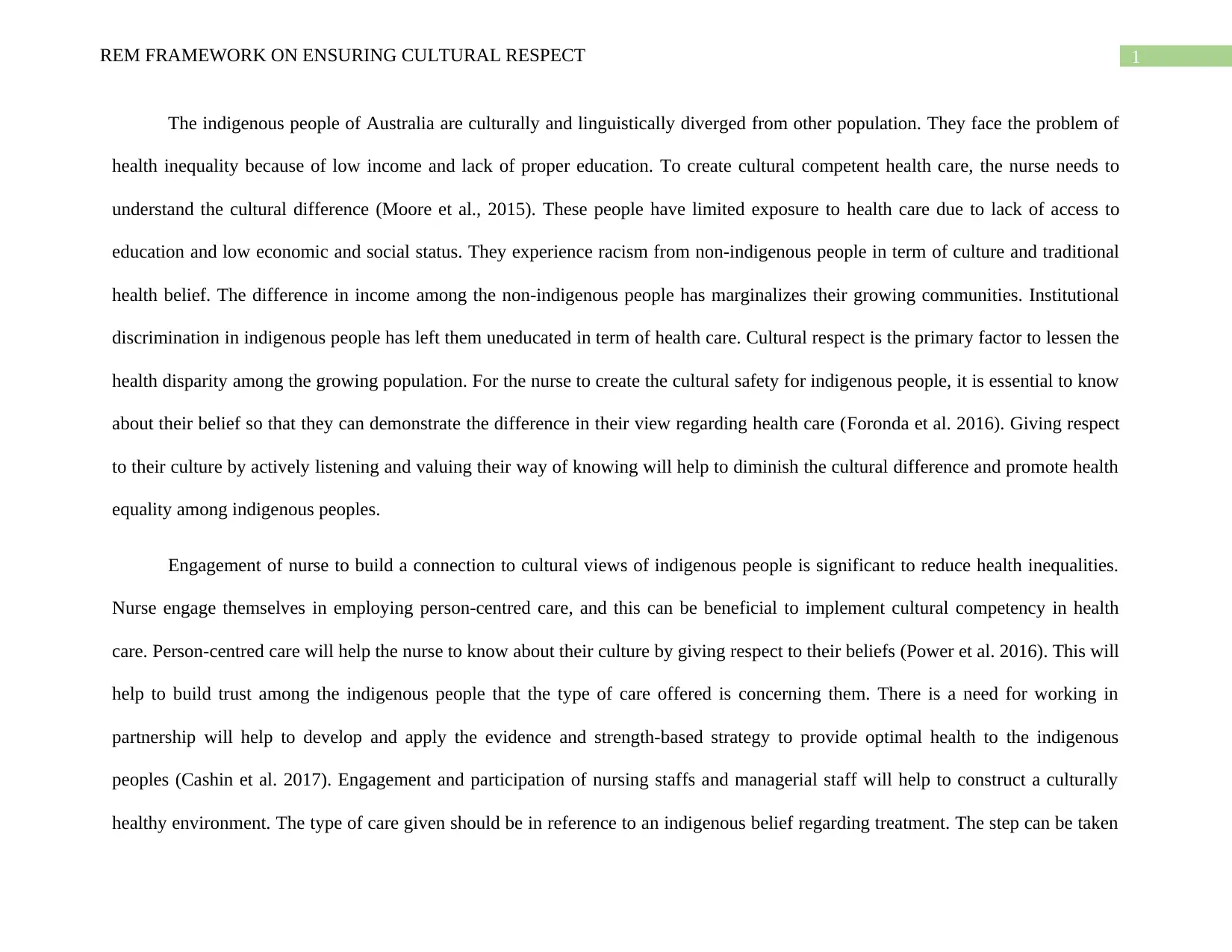
1REM FRAMEWORK ON ENSURING CULTURAL RESPECT
The indigenous people of Australia are culturally and linguistically diverged from other population. They face the problem of
health inequality because of low income and lack of proper education. To create cultural competent health care, the nurse needs to
understand the cultural difference (Moore et al., 2015). These people have limited exposure to health care due to lack of access to
education and low economic and social status. They experience racism from non-indigenous people in term of culture and traditional
health belief. The difference in income among the non-indigenous people has marginalizes their growing communities. Institutional
discrimination in indigenous people has left them uneducated in term of health care. Cultural respect is the primary factor to lessen the
health disparity among the growing population. For the nurse to create the cultural safety for indigenous people, it is essential to know
about their belief so that they can demonstrate the difference in their view regarding health care (Foronda et al. 2016). Giving respect
to their culture by actively listening and valuing their way of knowing will help to diminish the cultural difference and promote health
equality among indigenous peoples.
Engagement of nurse to build a connection to cultural views of indigenous people is significant to reduce health inequalities.
Nurse engage themselves in employing person-centred care, and this can be beneficial to implement cultural competency in health
care. Person-centred care will help the nurse to know about their culture by giving respect to their beliefs (Power et al. 2016). This will
help to build trust among the indigenous people that the type of care offered is concerning them. There is a need for working in
partnership will help to develop and apply the evidence and strength-based strategy to provide optimal health to the indigenous
peoples (Cashin et al. 2017). Engagement and participation of nursing staffs and managerial staff will help to construct a culturally
healthy environment. The type of care given should be in reference to an indigenous belief regarding treatment. The step can be taken
The indigenous people of Australia are culturally and linguistically diverged from other population. They face the problem of
health inequality because of low income and lack of proper education. To create cultural competent health care, the nurse needs to
understand the cultural difference (Moore et al., 2015). These people have limited exposure to health care due to lack of access to
education and low economic and social status. They experience racism from non-indigenous people in term of culture and traditional
health belief. The difference in income among the non-indigenous people has marginalizes their growing communities. Institutional
discrimination in indigenous people has left them uneducated in term of health care. Cultural respect is the primary factor to lessen the
health disparity among the growing population. For the nurse to create the cultural safety for indigenous people, it is essential to know
about their belief so that they can demonstrate the difference in their view regarding health care (Foronda et al. 2016). Giving respect
to their culture by actively listening and valuing their way of knowing will help to diminish the cultural difference and promote health
equality among indigenous peoples.
Engagement of nurse to build a connection to cultural views of indigenous people is significant to reduce health inequalities.
Nurse engage themselves in employing person-centred care, and this can be beneficial to implement cultural competency in health
care. Person-centred care will help the nurse to know about their culture by giving respect to their beliefs (Power et al. 2016). This will
help to build trust among the indigenous people that the type of care offered is concerning them. There is a need for working in
partnership will help to develop and apply the evidence and strength-based strategy to provide optimal health to the indigenous
peoples (Cashin et al. 2017). Engagement and participation of nursing staffs and managerial staff will help to construct a culturally
healthy environment. The type of care given should be in reference to an indigenous belief regarding treatment. The step can be taken
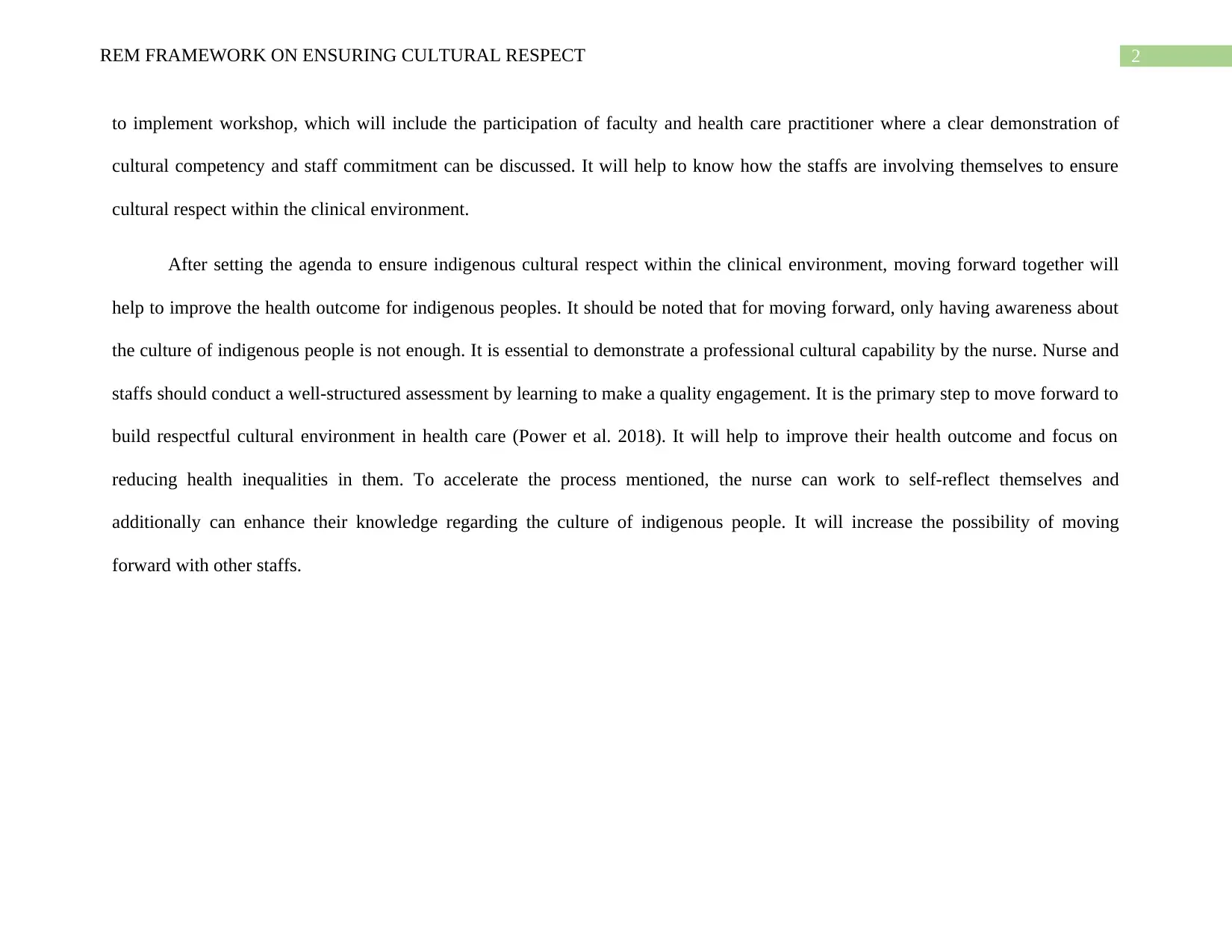
2REM FRAMEWORK ON ENSURING CULTURAL RESPECT
to implement workshop, which will include the participation of faculty and health care practitioner where a clear demonstration of
cultural competency and staff commitment can be discussed. It will help to know how the staffs are involving themselves to ensure
cultural respect within the clinical environment.
After setting the agenda to ensure indigenous cultural respect within the clinical environment, moving forward together will
help to improve the health outcome for indigenous peoples. It should be noted that for moving forward, only having awareness about
the culture of indigenous people is not enough. It is essential to demonstrate a professional cultural capability by the nurse. Nurse and
staffs should conduct a well-structured assessment by learning to make a quality engagement. It is the primary step to move forward to
build respectful cultural environment in health care (Power et al. 2018). It will help to improve their health outcome and focus on
reducing health inequalities in them. To accelerate the process mentioned, the nurse can work to self-reflect themselves and
additionally can enhance their knowledge regarding the culture of indigenous people. It will increase the possibility of moving
forward with other staffs.
to implement workshop, which will include the participation of faculty and health care practitioner where a clear demonstration of
cultural competency and staff commitment can be discussed. It will help to know how the staffs are involving themselves to ensure
cultural respect within the clinical environment.
After setting the agenda to ensure indigenous cultural respect within the clinical environment, moving forward together will
help to improve the health outcome for indigenous peoples. It should be noted that for moving forward, only having awareness about
the culture of indigenous people is not enough. It is essential to demonstrate a professional cultural capability by the nurse. Nurse and
staffs should conduct a well-structured assessment by learning to make a quality engagement. It is the primary step to move forward to
build respectful cultural environment in health care (Power et al. 2018). It will help to improve their health outcome and focus on
reducing health inequalities in them. To accelerate the process mentioned, the nurse can work to self-reflect themselves and
additionally can enhance their knowledge regarding the culture of indigenous people. It will increase the possibility of moving
forward with other staffs.
⊘ This is a preview!⊘
Do you want full access?
Subscribe today to unlock all pages.

Trusted by 1+ million students worldwide
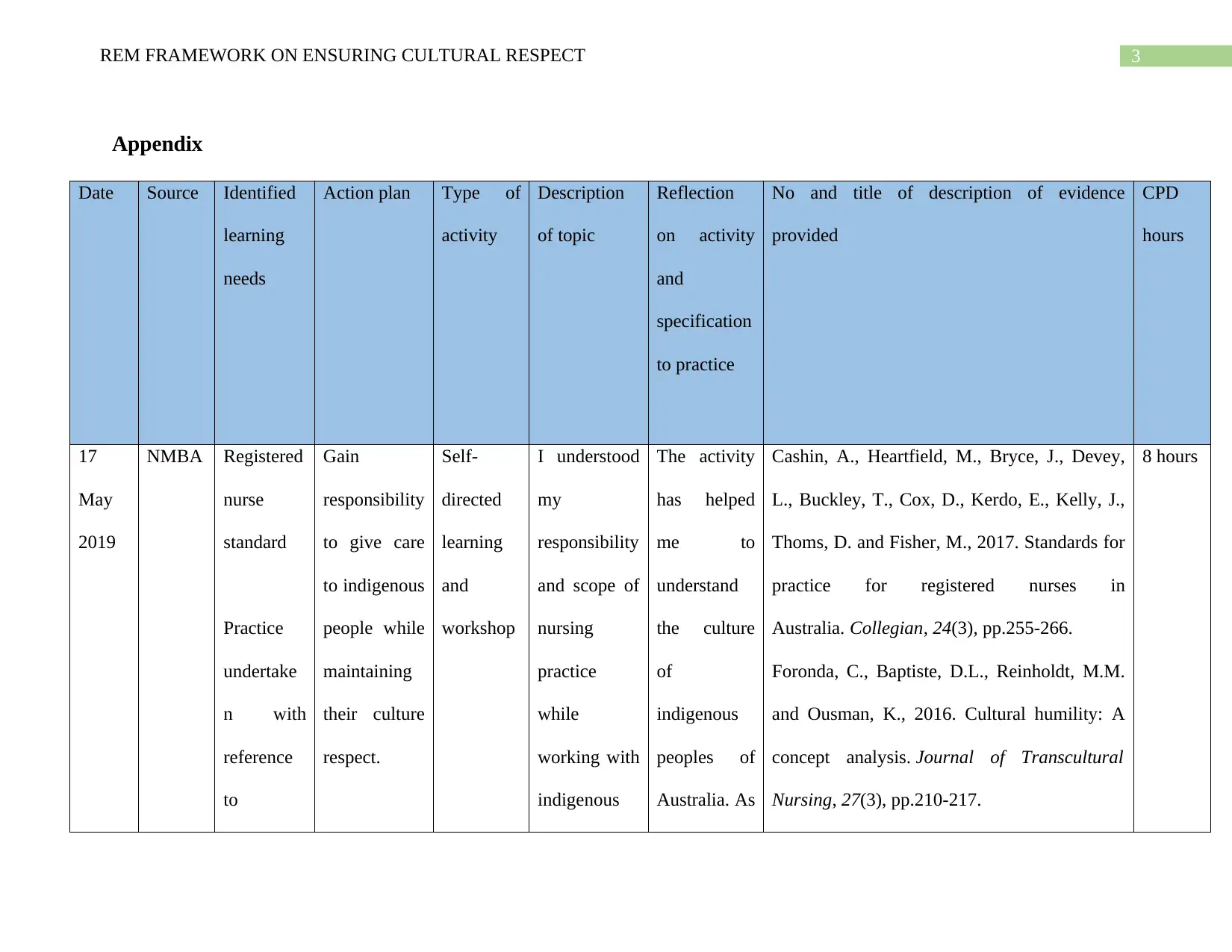
3REM FRAMEWORK ON ENSURING CULTURAL RESPECT
Appendix
Date Source Identified
learning
needs
Action plan Type of
activity
Description
of topic
Reflection
on activity
and
specification
to practice
No and title of description of evidence
provided
CPD
hours
17
May
2019
NMBA Registered
nurse
standard
Practice
undertake
n with
reference
to
Gain
responsibility
to give care
to indigenous
people while
maintaining
their culture
respect.
Self-
directed
learning
and
workshop
I understood
my
responsibility
and scope of
nursing
practice
while
working with
indigenous
The activity
has helped
me to
understand
the culture
of
indigenous
peoples of
Australia. As
Cashin, A., Heartfield, M., Bryce, J., Devey,
L., Buckley, T., Cox, D., Kerdo, E., Kelly, J.,
Thoms, D. and Fisher, M., 2017. Standards for
practice for registered nurses in
Australia. Collegian, 24(3), pp.255-266.
Foronda, C., Baptiste, D.L., Reinholdt, M.M.
and Ousman, K., 2016. Cultural humility: A
concept analysis. Journal of Transcultural
Nursing, 27(3), pp.210-217.
8 hours
Appendix
Date Source Identified
learning
needs
Action plan Type of
activity
Description
of topic
Reflection
on activity
and
specification
to practice
No and title of description of evidence
provided
CPD
hours
17
May
2019
NMBA Registered
nurse
standard
Practice
undertake
n with
reference
to
Gain
responsibility
to give care
to indigenous
people while
maintaining
their culture
respect.
Self-
directed
learning
and
workshop
I understood
my
responsibility
and scope of
nursing
practice
while
working with
indigenous
The activity
has helped
me to
understand
the culture
of
indigenous
peoples of
Australia. As
Cashin, A., Heartfield, M., Bryce, J., Devey,
L., Buckley, T., Cox, D., Kerdo, E., Kelly, J.,
Thoms, D. and Fisher, M., 2017. Standards for
practice for registered nurses in
Australia. Collegian, 24(3), pp.255-266.
Foronda, C., Baptiste, D.L., Reinholdt, M.M.
and Ousman, K., 2016. Cultural humility: A
concept analysis. Journal of Transcultural
Nursing, 27(3), pp.210-217.
8 hours
Paraphrase This Document
Need a fresh take? Get an instant paraphrase of this document with our AI Paraphraser
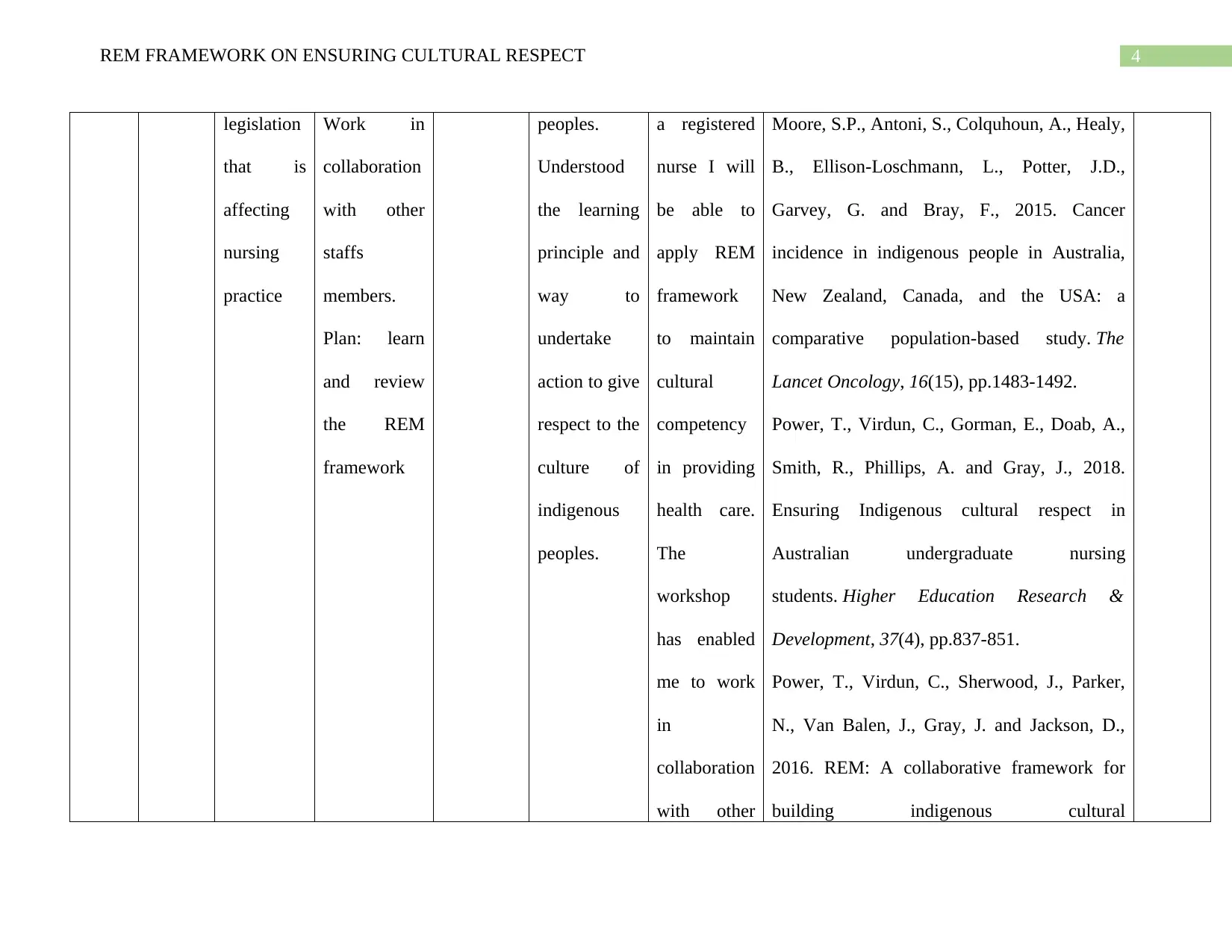
4REM FRAMEWORK ON ENSURING CULTURAL RESPECT
legislation
that is
affecting
nursing
practice
Work in
collaboration
with other
staffs
members.
Plan: learn
and review
the REM
framework
peoples.
Understood
the learning
principle and
way to
undertake
action to give
respect to the
culture of
indigenous
peoples.
a registered
nurse I will
be able to
apply REM
framework
to maintain
cultural
competency
in providing
health care.
The
workshop
has enabled
me to work
in
collaboration
with other
Moore, S.P., Antoni, S., Colquhoun, A., Healy,
B., Ellison-Loschmann, L., Potter, J.D.,
Garvey, G. and Bray, F., 2015. Cancer
incidence in indigenous people in Australia,
New Zealand, Canada, and the USA: a
comparative population-based study. The
Lancet Oncology, 16(15), pp.1483-1492.
Power, T., Virdun, C., Gorman, E., Doab, A.,
Smith, R., Phillips, A. and Gray, J., 2018.
Ensuring Indigenous cultural respect in
Australian undergraduate nursing
students. Higher Education Research &
Development, 37(4), pp.837-851.
Power, T., Virdun, C., Sherwood, J., Parker,
N., Van Balen, J., Gray, J. and Jackson, D.,
2016. REM: A collaborative framework for
building indigenous cultural
legislation
that is
affecting
nursing
practice
Work in
collaboration
with other
staffs
members.
Plan: learn
and review
the REM
framework
peoples.
Understood
the learning
principle and
way to
undertake
action to give
respect to the
culture of
indigenous
peoples.
a registered
nurse I will
be able to
apply REM
framework
to maintain
cultural
competency
in providing
health care.
The
workshop
has enabled
me to work
in
collaboration
with other
Moore, S.P., Antoni, S., Colquhoun, A., Healy,
B., Ellison-Loschmann, L., Potter, J.D.,
Garvey, G. and Bray, F., 2015. Cancer
incidence in indigenous people in Australia,
New Zealand, Canada, and the USA: a
comparative population-based study. The
Lancet Oncology, 16(15), pp.1483-1492.
Power, T., Virdun, C., Gorman, E., Doab, A.,
Smith, R., Phillips, A. and Gray, J., 2018.
Ensuring Indigenous cultural respect in
Australian undergraduate nursing
students. Higher Education Research &
Development, 37(4), pp.837-851.
Power, T., Virdun, C., Sherwood, J., Parker,
N., Van Balen, J., Gray, J. and Jackson, D.,
2016. REM: A collaborative framework for
building indigenous cultural
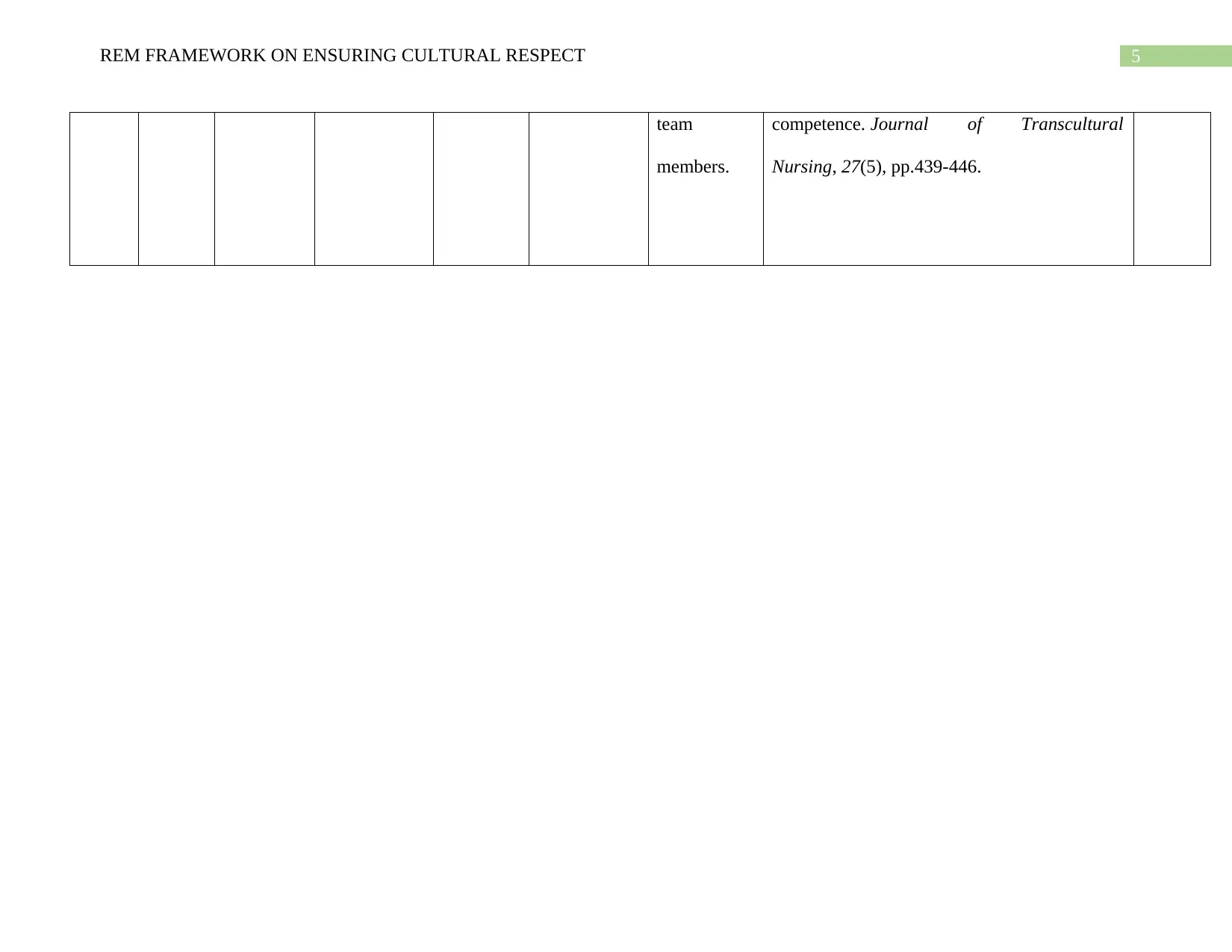
5REM FRAMEWORK ON ENSURING CULTURAL RESPECT
team
members.
competence. Journal of Transcultural
Nursing, 27(5), pp.439-446.
team
members.
competence. Journal of Transcultural
Nursing, 27(5), pp.439-446.
⊘ This is a preview!⊘
Do you want full access?
Subscribe today to unlock all pages.

Trusted by 1+ million students worldwide
1 out of 6
Related Documents
Your All-in-One AI-Powered Toolkit for Academic Success.
+13062052269
info@desklib.com
Available 24*7 on WhatsApp / Email
![[object Object]](/_next/static/media/star-bottom.7253800d.svg)
Unlock your academic potential
Copyright © 2020–2025 A2Z Services. All Rights Reserved. Developed and managed by ZUCOL.





